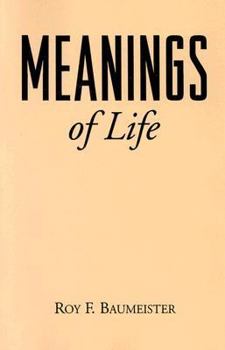Meanings of Life
Select Format
Select Condition 
Book Overview
Who among us has not at some point asked, what is the meaning of life?'' In this extraordinary book, an eminent social scientist looks at the big picture and explores what empirical studies from diverse fields tell us about the human condition. MEANINGS OF LIFE draws together evidence from psychology, history, anthropology, and sociology, integrating copious research findings into a clear and conclusive discussion of how people attempt to make sense...
Format:Paperback
Language:English
ISBN:0898625319
ISBN13:9780898625318
Release Date:September 1992
Publisher:Guilford Publications
Length:426 Pages
Weight:1.42 lbs.
Dimensions:1.1" x 6.1" x 9.2"
Customer Reviews
2 ratings
a psychological overview
Published by Thriftbooks.com User , 19 years ago
This book is not an attempt to tell us what the "meanings of life" are, just what we think they are: it's psychology, not philosophy. An interesting aspect of the book is the explorations of ways that we sometimes find our "meanings" inadequate. Baumeister begins with a definition of meaning which I consider simply confused, but then my background is in philosophy. Fortunately, his definition is irrelevant to the rest of the book. He suggests that the need for meaning can be (more or less arbitrarily, as he admits) considered under four aspects: purpose, value, efficacy, and self-worth. Purpose is roughly equal to goals, although especially goals that (appear to) transcend arbitrary individual choice. We usually prefer to be working towards some goals that we imagine will be very fulfilling. As Baumeister explores, we usually find achieving these goals fulfilling for a brief time only, before we conceive some new goal, some new future state that we imagine will be satisfying. Or occasionally we get disappointed with our general life-project, endure a period of depression or uncertainty, and find a new direction. This analysis is spot-on, and leads me to suggest that we consider more satisfying alternatives to ambition; for instance, gratitude. Czikszentmihalyi's work on "flow" would also be interesting to explore. Instead, Baumeister gives an interesting analysis of religious ideals of fulfillment in the afterlife, pointing out that since we never get any news from the afterlife, these never prove disappointing, unlike ideals of fulfillment in this life. Therefore, people may find religious goals meaningful to the very end, while secular goals may prove disappointing. (I'm not sure how a devoutly religious person would react to this book. It doesn't flatter them at all, but if you read carefully, I think you can detect that Baumeister is trying to avoid condescension.) The second meaning is value, as in moral value: a sense that our lives contribute to the goodness of the world. Baumeister argues that the decline in religious belief (in certain cultures or segments of society) leaves a "value gap." We are not sure how to morally justify our lives. Several chapters of the book analyze ways that we try to fill the value gap, especially with the "self." Baumeister follows a few other cultural critics arguing that past cultures did not value the self or look to it as a source of value, and he convincingly argues that our modern culture has begun to do that in an attempt to fill the value gap. He looks at how this has transformed the way we think of our relationships, our work, suffering, and especially death. A third need is efficacy, to feel that we really do accomplish something, that we have useful skills. He didn't explore this much, considering it fairly easy for most of us to meet this need in modern society. He does refer to some studies on the elderly, to whom this issue is often more poignant; also to some relevant studies of anorex
Revealing and Thought Provoking
Published by Thriftbooks.com User , 27 years ago
Read this book for a tutorial class called "Construction and Maintenance of the Self". Baumeister conveys his theoritical perspective on the meaning of the self (and its implications on the meanings of life)in a highly accessible and convincing manner. He argues from the perspective that the self is a social construct and that in the West, the meanings that have been put into the construction and maintenance of this self have created a burden on the individual. The stress associated with maintaining this concept of self can be used to explain why people engage in behaviors such as alcholism and sado-masochism. I highly recommend this book, especially if you are interested in concepts of the self and its relation to (what Baumeister would not consider) self-disruptive behaviors.






